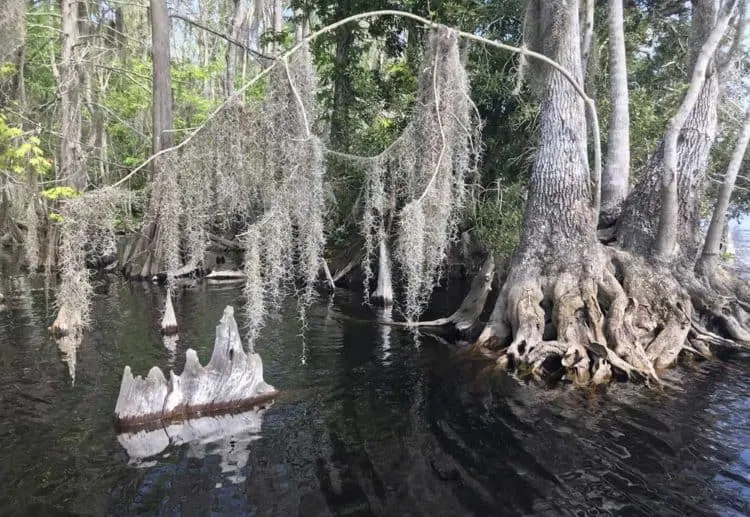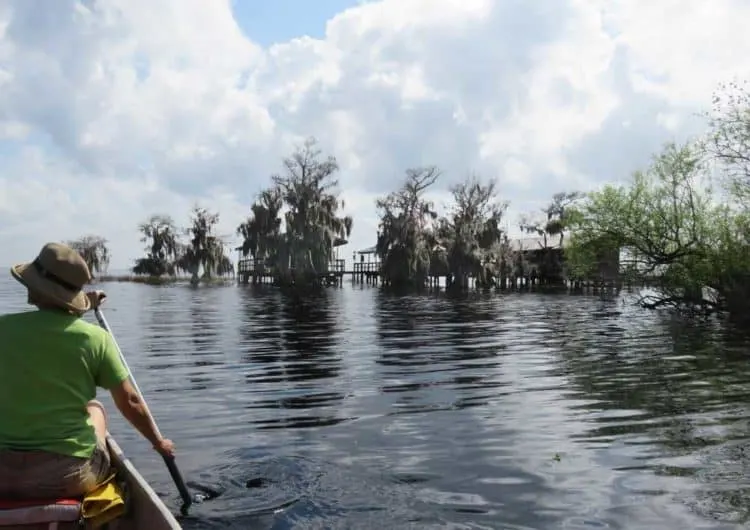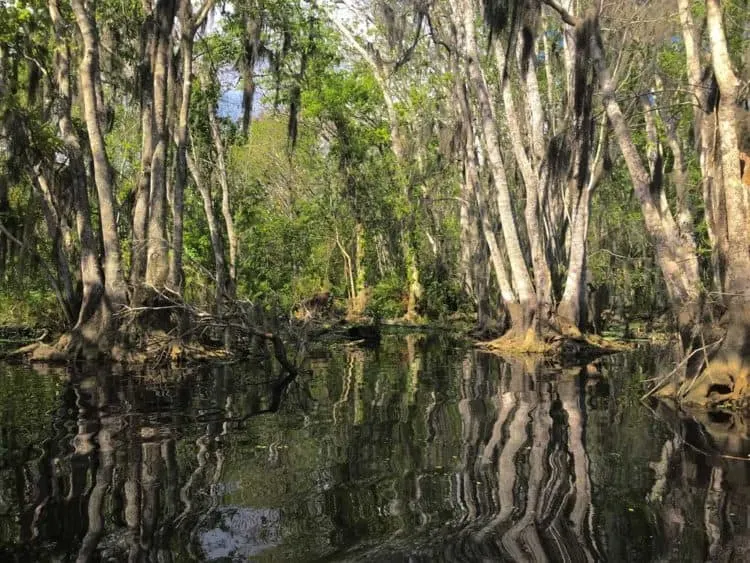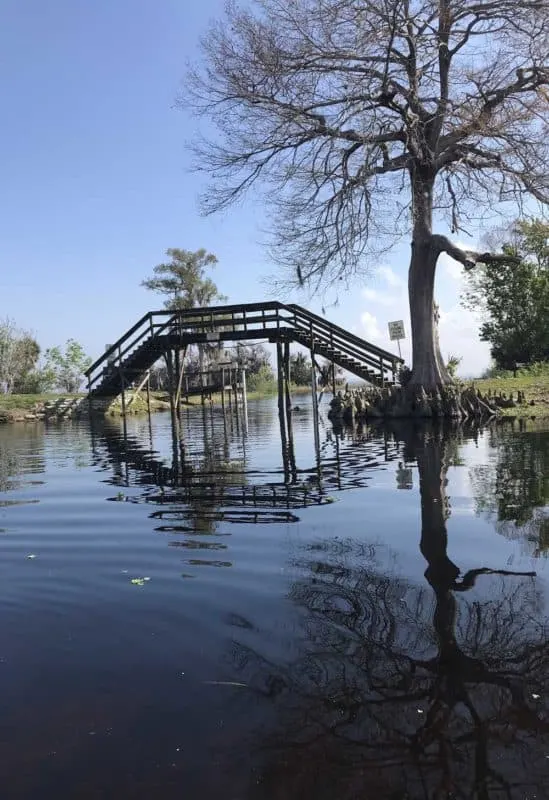I always thought there was a whole lot of nothing in the middle of the state above Lake O, a region where the highlight is Yeehaw Junction.
But then, after many years of exploring Florida, I recently learned about a true hidden gem: Blue Cypress Lake.
When we finally paddled this very off-the-beaten-path lake, I was awestruck by how gorgeous it is and surprised that I had never heard about it before.

The only public access is a small park operated by Indian River County and named after the late fishing guide Joe Middleton, who ran Middleton Fish Camp. The lake, whose average depth is 8 feet, has perfect conditions for bass and other fish, so perhaps if I had been a fisherman, I might have heard about it before.
From the free boat ramp, you can launch your kayak or powerboat into a lake whose shoreline is studded with hundreds of spectacular bald cypress trees strung with Spanish moss and surrounded by picturesque knees.
Blue Cypress Lake: Remarkable number of osprey nests
Not only is the scenery gorgeous, but I have never seen so many ospreys before. I had read that the lake is home to more than 200 osprey nests, and I assumed that was an exaggeration. But I think that might be an under-count.
We paddled a few miles of the 21-mile shoreline of the big lake, and we saw at least two dozen nests.
We could not count the number of ospreys, who were constantly flying overhead building their nests and chatting back and forth. Their “keer keer keer” was the perpetual background music. (And we know the fishing is good because so many ospreys had fish in their mouths.)
The ospreys attract serious nature photographers, especially in late spring when the osprey chicks are fledging and the adults are active in their constant feeding routine.
There were other birds – two roseate spoonbill‘s flew overhead, a number of ibis, great blue herons. A surprising number of limpkins hung out near the boat docks. I’m sure better birders could identify more.
There were several shy gators, turtles and a couple of snakes in the trees.
Blue Cypress Lake: A completely natural shoreline
What makes this such an idyllic natural locale is the lack of development. The St. Johns River Water Management District owns most of the shoreline because the lake is the headwater of the St. Johns River, which flows north 300 miles to Jacksonville and the Atlantic Ocean. The lake is surrounded by 29,000 acres of marshes, swamps, and cypress forests.
From the boat launch, we paddled clockwise, north along the shoreline, which I had read was the most scenic section. We were surrounded by cypress trees, some of which grew quite a distance out in the lake. We felt like we were paddling through a cypress swamp or down a river rather than in an open lake.
Along the shore, we enjoyed looking for one of the rivers that flows into the lake, Blue Cypress Creek. It is not easy to spot and you can’t paddle very far upstream, but it’s a pretty side trip. You’ll know you’re in the river when you note the water flowing out.
We paddled a few hours and never found any access to solid land, so we ate our picnic in our boat.
On our return, the wind picked up and there were choppy waves on what is a sizable lake. (It’s about 7 miles by 3 miles.) I wouldn’t recommend this lake for a windy day or a canoe.
But I would recommend it as a terrific outing by kayak. On a sunny February weekday, we spent several hours on the lake and saw three kayakers, one power boat and one air boat. It is a remarkably wild and natural place just a few hours from my urban Broward County home.
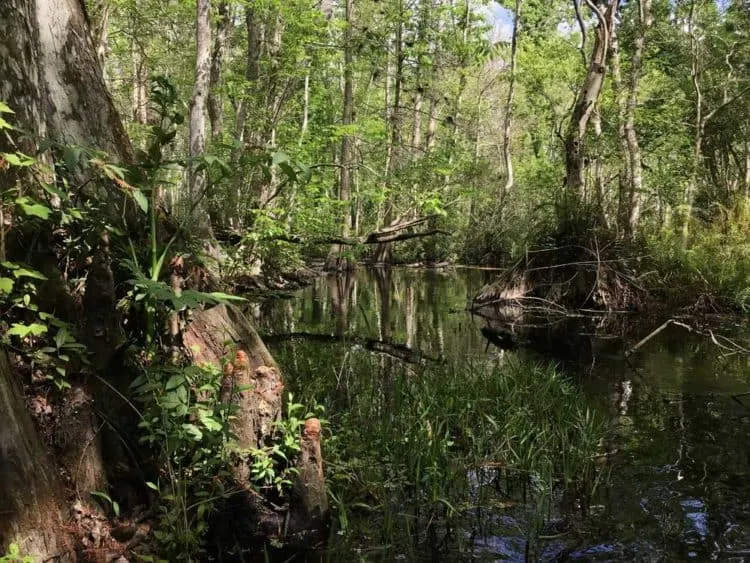
How to explore Blue Cypress Lake
Blue Cypress Lake is located about 5 miles east of Florida’s Turnpike exit at Yeehaw Junction just north of State Road 60. It is about 22 miles west of Vero Beach.
There are no kayak rentals at the launch site. You can arrange for kayaks through outfitters in Vero Beach, including www.tropicalkayaktours.com and Adventure Kayaking.
Camping and cottages at Blue Cypress Lake
The county park has several picnic tables and allows camping on a first come first serve basis, charging $5 per person. Tent camping is on a peninsula lakeside with pretty views of the cypress and the lake. RVs are parked along a road that parallels a wildlife-filled canal close to the lake.
The park has restrooms and a small staffed office where you can get a map.
The only development on the lake is a small village with perhaps 50 cabins and trailers adjacent to the county park. There are some cabins for rent here including some particularly picturesque cabins built on stilts in the lake.
- Cabins rentals at bluecypresslakesidecabins.com start at $80 a night: 772-770-2067.
- The Middleton Fish Camp offers bait, airboat tides and eco tours.
Blue Cypress Lake
7400 Blue Cypress Road
Vero Beach, FL 32966
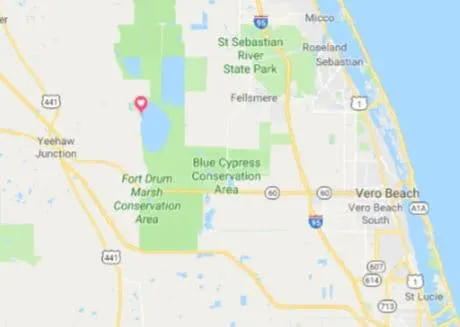
What’s near Blue Cypress Lake
Vero Beach, a half hour east of Blue Cypress Lake, is a low-key beach town that’s easy to fall in love with, from the Historic Driftwood Inn to the hold Jungle Trail to its charming downtown with many original buildings.
Pelican Island, the nation’s first National Wildlife Refuge, 4055 Wildlife Way, Vero Beach, offers trails, a boardwalk and an observation tower overlooking the island, which is a bird rookery. It’s 15 miles north of Vero Beach.
Sebastian Inlet State Park, 9700 S. Highway A1A, Melbourne Beach, is a good destination for kayaking and camping.
St. Sebastian River Preserve State Park, 1000 Buffer Preserve Dr., Fellsmere, is a wilderness park that can be explored by hiking, biking and horseback.
Hutchinson Island, the coastal barrier island area south of Vero Beach, is full of beaches and interesting places, including Avalon State Park, N. Highway A1A, Fort Pierce, where Navy frogmen practiced for D-Day. More obstacles placed in the water to challenge them in their landings are still there. The Navy Seal Museum, 3300 N. Highway A1A, Fort Pierce, in nearby Fort Pierce is a good place to learn about this history.
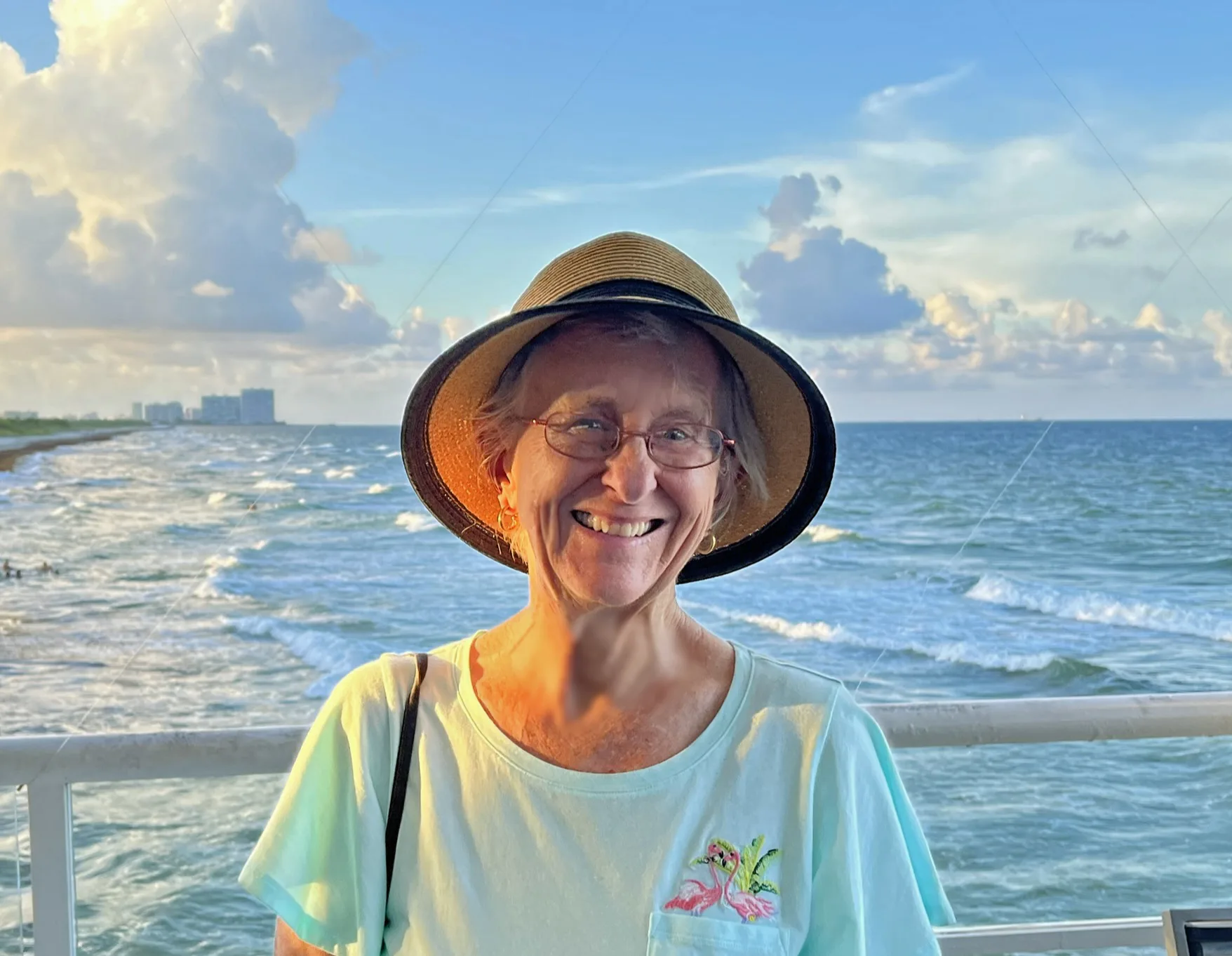
The author, Bonnie Gross, travels with her husband David Blasco, discovering off-the-beaten path places to hike, kayak, bike, swim and explore. Florida Rambler was founded in 2010 by Bonnie and fellow journalist Bob Rountree, two long-time Florida residents who have spent decades exploring the Florida outdoors. Their articles have been published in the Sun Sentinel, the Miami Herald, the Orlando Sentinel, The Guardian and Visit Florida.

